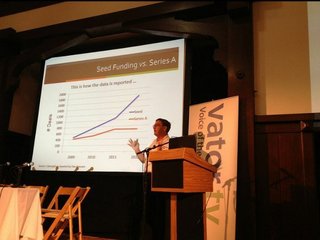
The VCs aren't your enemy, even though they're holding the cash you need to get your startup going

There’s a very clear power imbalance when it comes to the relationship between an entrepreneur and a potential investor. You have this super awesome amazing thing that you’re very passionate about and put a lot of work into, and you’re pitching to a skeptical VC. Understandably, the experience might make a founder a little...aggressive. Maybe a tad bloodthirsty?
With so many entrepreneurs vying for Series A funding, it seems like a natural kneejerk response to just try to get as much as you can. But this is the wrong way to approach a potential investor. The reality is that your Series A investors are going to be much more involved in your startup than a Series B or C investor would be. When shopping for a Series A investor, you’re shopping for the perfect fit—for someone who’s going to be on your board for the next seven to ten years.
The Series A relationship was a topic of discussion at Venture Shift on Wednesday night in a panel consisting of Shasta Ventures' Tod Francis, Data Collective's Matt Ocko, Julep's Padma Rao, Ackrell Capital's Ezra Roizen, WIN's Mike Nirel, and moderated by KPMG's Mike McCormick. Matt Ocko of Data Collective had this to say about it:
“I’ve seen an endless profusion of articles advocating a Darwinian approach to raising capital—VCs are greedy and stupid, take them for all they’re worth. As with everything in life, you eventually get out what you put in. If you start out with an adversarial relationship with your seed—unless you’re killing it, and statistically, not everyone kills it—you’ll have an adversarial relationship in your A, and they’ll tell newcomers that maybe you’re tough to work with,” said Ocko, adding: “It’s easy to mythologize and demonize on both sides. Make sure your relationship is thoughtful and productive rather than adversarial. Big wins take 10 years. Google is an eight-year overnight success. Ditto for Facebook.”
Padma Rao of Julep echoed that problem: “for a lot of companies I advise, the entrepreneurs don’t spend a lot of time warming up their investors to get to know them, to build confidence and see if they’re a good fit.”
“You’re building a partnership, and communication and transparency is important,” chimed WIN’s Mike Neril. “Having some type of quarterly communication update is important.”
What makes the Series A unique and why is it so problematic when it comes to getting funding? The reality is that at the Series A point in a startup’s evolution, there still might not be much hard traction or strong results to go on.
“At the Series A stage, there’s still a lot of volatility and lot of risk,” said Padma Rao. “You still have a lot of dependency on their decision making and ability to execute.”
Matt Ocko agreed and explained that at that point, a Series A investment is largely reliant on trust.
“A lot of the A comes back to faith and good will. A baller team is a chip that buys you faith in doing the A, traction is a token of faith in the team regardless of their credentials or lackthereof.”
"The investor isn't your enemy," said Ackrell Capital's Ezra Roizen. "It's the entrepreneur sitting next to you."
So in conclusion: don’t be a jerk about it.
Related Companies, Investors, and Entrepreneurs

Mike McCormick
Joined Vator on
Mike is an audit senior manager in KPMG's Silicon Valley office. Mike specializes in providing audit services to software and SaaS companies.
Padma Rao
Joined Vator on
I focus on direct to consumer products whether digital or real. Currently, I work towards starting my own consumer company as I advise several VC firms and companies.
Ezra Roizen
Joined Vator on
Advisor-to and commenter-on emerging ventures
Tod Francis
Joined Vator on
Tod Francis is with Shasta Ventures. He focuses his investing activity on early stage companies that leverage technology to improve consumer experiences.Related News


Are we in a Series A crunch? You bet your ass we are.

